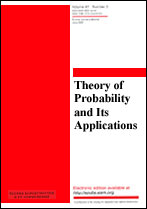|
This article is cited in 184 scientific papers (total in 184 papers)
General asymptotic Bayesian theory of
quickest change detection
A. G. Tartakovskiia, V. Veeravallib
a University of Southern California
b University of Illinois at Urbana-Champaign
Abstract:
The optimal detection procedure for detecting changes in independent and identically
distributed (i.i.d.) sequences in a Bayesian setting was derived by Shiryaev in the
1960s sixties. However, the analysis of the
performance of this procedure in
terms of the average detection delay and false alarm probability has been an open
problem. In this paper, we develop a general asymptotic change-point detection
theory that is not limited to a restrictive i.i.d. assumption. In particular, we
investigate the performance of the Shiryaev procedure for general discrete-time
stochastic models in the asymptotic setting, where the false alarm probability
approaches zero. We show that the Shiryaev procedure is asymptotically optimal in
the general non-i.i.d. case under mild conditions. We also show that the two
popular non-Bayesian detection procedures, namely the Page and the
Shiryaev–Roberts–Pollak procedures, are generally not optimal (even asymptotically)
under the Bayesian criterion. The results of this study are shown to be especially
important in studying the asymptotics of decentralized
change detection procedures.
Keywords:
change-point detection, sequential detection, asymptotic optimality, nonlinear renewal theory.
Received: 07.11.2003
Citation:
A. G. Tartakovskii, V. Veeravalli, “General asymptotic Bayesian theory of
quickest change detection”, Teor. Veroyatnost. i Primenen., 49:3 (2004), 538–582; Theory Probab. Appl., 49:3 (2005), 458–497
Linking options:
https://www.mathnet.ru/eng/tvp207https://doi.org/10.4213/tvp207 https://www.mathnet.ru/eng/tvp/v49/i3/p538
|


| Statistics & downloads: |
| Abstract page: | 742 | | Full-text PDF : | 214 | | References: | 130 |
|




 Contact us:
Contact us: Terms of Use
Terms of Use
 Registration to the website
Registration to the website Logotypes
Logotypes








 Citation in format
Citation in format 
